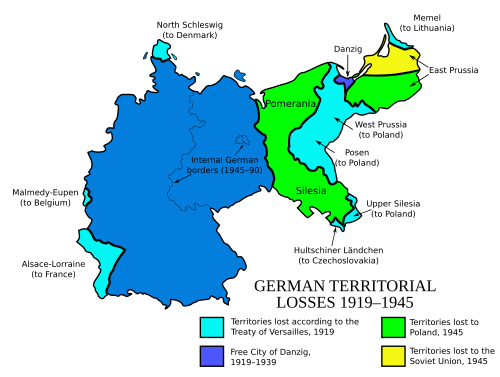Cameroon (Kamerun) being a defeated territory during World War One suffered the same fate as its defeated former colonial master (Germany) and their paths to unification and reunification are identical, which makes them analogous. So I hope this analogy makes things less hazy for readers.
Otto von Bismarck pushed for German unification through "blood and iron" (culminating in the Franco-Prussian War of 19 July 1870 – 10 May 1871) and skillful understanding of realpolitik, so that the princes of the various German states led by Prussia, proclaimed a German nation-state Deutschland with Wilhelm I of Prussia as German Emperor. This was done on 18 January 1871, in the Hall of Mirrors at the Palace of Versailles, France, following the capitulation of France in the Franco-Prussian War. France lost Alsace and Lorraine (French provinces with ethnic German majorities) to Germany from that defeat. A decade later, the unified German nation-state brought together (unification) villages, tribes, ethnic groups, traditional African kingdoms (chefferies or fondoms, sultanates and lamidates into the German protectorate and later colony popularly called Kamerun. In 1911, following the Agadir crisis in Morocco where Germany and France were on the brink of a war over the control of this Berber territory, France caved in and offered Germany territories in what are in today's Central African Republic, Gabon, and the Congo Republic in exchange for Germany relinquishing claims to Morocco. In addition to that exchange, Germany gave a piece of Kamerun to France, a territory currently in Chad (Ndjamena and the environs). This new acquisition constituted NeuKamerun (New Kamerun). The other big powers did not recognize France’s loss.


World War One came to pass with Germany and its colonies defeated, and Germany stripped of its colonies and parts of Germany with substantial non-ethnic Germans (Alsace and Loraine to France, Duchy of Schleswig to Denmark, and parts of Prussia and Pomerania to Poland), Eupen-Malmedy to Belgium. In the case of Kamerun, the victorious powers stripped it of the territories Germany acquired for Kamerun in 1911 (NeuKamerun). Then they went on and partitioned the Kamerun mainland into British Cameroons (British Northern Cameroons and British Southern Cameroons) and French Cameroun.


Germany suffered Kamerun’s fate of partition after the Second World War when it was divided into four zones of control (British Zone, French Zone, American Zone, and Soviet (Russian) zone). Later, the American, French, and British Zones merged and formed the Federal Republic of Germany (West Germany). The Russian zone evolved into the German Democratic Republic (East Germany). In 1989, East Germany reunited with West Germany (German Reunification).

In 1961, British Southern Cameroons gained independence by reuniting (Reunification or rejoining) with the former French Cameroun, which had been granted independence (quasi) by France on January 01, 1960. French Cameroun achieved independence as La Republique du Cameroun (The Republic of Cameroun) through the French puppet Ahmadou Ahidjo in disregard of the majority wish of Cameroonians on both sides of the River Mungo who were supporting the anti-French colonialist and anti-British colonialist forces (UPC, KNDP, OK) that were for a negotiated reunification between the British Cameroons and French Cameroun before independence.
Cameroon (Kamerun) over time

Cameroon (Kamerun) over time
The deception by Britain and France using the Western tool Ahidjo, who handed over power to another tool of imperialism (Paul Biya) is what is haunting Cameroon and Cameroonians today.
Germany is under the USA’s political thumb today, just like Kamerun is under France’s socio-economic and political thumb. That is why the struggle for the New Cameroon needs to be two-pronged---France (not the common French people) and the Cameroonian political establishment made up of Anglophone and Francophone Cameroonians acting in symbiosis to maintain the French-imposed system that is neocolonialism at its worst and that is a French neofascist system of control learned from Nazi Germany during its occupation of France from 1940-1944, a system that is the brainchild of the French legendary General Charles De Gaulle and his right-hand man Jacques Foccart, who together with their retinue decided to implement this racist system of control over French colonies in Africa before granting them their quasi-independence. This system regards Francophone Africa as France's backyard or France's interest abroad that it defends by using African puppet dictators who are not the choice of their people and who are not in power to safeguard the interests of the countries they are heads of state of. These so-called African heads of state are nothing more than the equivalent of Nazi kapos. That is why the French-imposed system in Cameroon today that is managed by the 36-year Biya regime must be completely dismantled in order to build the "New Cameroon" that was the original vision of Cameroon's civic-nationalists (its union-nationalists) that were killed, exiled and excluded from political power by France before and after it granted Cameroon its quasi-independence through the hands of its puppet Ahmadou Ahidjo, the predecessor of Paul Biya.
Janvier Tchouteu is the author of “FALLEN HEROES: African Leaders Whose Assassinations Disarrayed the Continent and Benefitted Foreign Interests”
https://amazon.com/dp/1980996695/ref=cm_sw_r_tw_dp_JX6Q26H573RSKG7HT9V6
vier Tchouteu is also the author of " The Mistakes To Be Avoided in Building The New Cameroon"
Cameroon: France’s Dysfunctional Puppet System in Africa
by Janvier Tchouteu




No comments:
Post a Comment